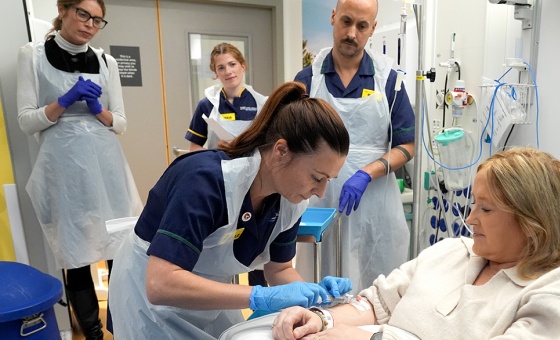This is the last article you can read this month
You can read more article this month
You can read more articles this month
Sorry your limit is up for this month
Reset on:
Please help support the Morning Star by subscribing here
IN RECENT days we have heard senior executives and experts express deep concerns about the NHS, the justice system and about policing. These are not the complaints about ongoing deterioration in public services that have unfortunately become commonplace after 14 dreadful years of Tory rule.
No, these are new complaints about the effect on public services under the Labour government’s plans over the next few years.
As a result, there is now a chasm between the PR spin on the Budget and the reality as experienced by senior managers tasked with organising and delivering those services.
That chasm reflects the reality enormous level of underfunding of public services overall. Therefore, we should expect these complaints to get louder and become even more widespread, and are sure to spread to local government an other areas.
The head of the Royal College of Nursing (RCN) recently revealed an acceleration in the trends of falling enrolment of nurses and falling rates of retention of qualified nurses. Inevitably, poor pay and condition are cited in both cases.
But the NHS was supposed to be one of the key beneficiaries of increased government outlined in the Budget.
Clearly, though, the 5.5 per cent pay ward is insufficient to reverse these trends in staffing. This is because the real growth in spending on public services across the life of this Parliament will be abysmally low, barely above 2 per cent a year on average.
Overall, total departmental expenditure limits will be rising at a rate comparable to the last 14 years, nothing better.
While the PR (and large parts of the Treasury Budget documents) focused on the next 18 months, the austerity in public services is there for all to see in the funding projections for the remainder of this Parliament.
If spending in key public services will only grow at the same pace as the last 14 years, then we should not expect any different outcomes.
For the same reason, we have also heard complaints from chief executives in the NHS trusts. A survey for NHS providers of 171 trust chief executives show the majority believing that it is unlikely or very unlikely that they will be able to get back within the standard of treating patients within 18 weeks any time over the next five years.
They specifically cite funding pressures as the reason.
The failure to meet the 18-week standard would be a breach of the Labour manifesto pledge. But the funding is wholly inadequate to meet that target.
By comparison, when Blair and Brown increased real NHS funding by an average of 5.5 per cent per year each year under the Labour government, the NHS thrived and waiting lists and waiting times plummeted. We know what is needed to address the crisis in the NHS.
Yet the latest Budget plan for the NHS is a one-off boost of £22.5 billion, which the spokesperson for NHS providers says will overwhelmingly be eaten up by existing commitments. Future years’ settlement will be miserably low, even below average growth under the Tories.
At the same time, Blairite minister-turned-lobbyist for private health Alan Milburn decries what he calls the “more, more, more culture” of the NHS and says it is “drinking in the last-chance saloon.”
Oddly this never seems to apply to the MoD, where it is ministers who lead the charge for more, more, more.
The NHS is being set up to fail. The false claim of vast new spending will be followed by the inevitable clamour for alternative models, privatised models, when there is no appreciable improvement in performance. The funding is not being made for improvement.
Similarly false claims of generous funding have been made across the public sector. But experts and chiefs can see the reality in their own outline budgets.
That is why Met Commissioner Mark Rowley says that the government is forcing through eye-watering cuts. Charlie Falconer is calling for the Ministry of Justice budget to be ring-fenced because he knows next year’s planned increase is just a one-off.
Tales like this, and complaints like will become the norm across the public sector as the reality of austerity is itemised in multiyear budgets.
There should be no surprise that newspapers which support austerity have not called out this Labour version of it. There is no surprise too that outlets that support Starmer will not call it out either. Yet it is vital that the labour movement is clear-headed about what is happening.
It would be very surprising if there was an immediate rising tide of militancy in unions against austerity where many members have just received substantial pay awards (and it is not accident that the RCN is one of the exceptions to this, given the way they were treated and the end of their dispute).
Union members should see those pay increases as a reward for their hard work, militancy and determination during their disputes. But those above-inflation pay increases cannot be on offer in subsequent years while Rachel Reeves stays within her “fiscal envelope” for this Parliament.
Further improvements in pay can be won, but only by forcing an unwilling government to do so. And unions must be clear that they are funded with new money, not taken out of existing budgets as is the case this year. Non-pay cuts to funding for essential services are simply not achievable without decimating services.
Yet this points to a wider issue. The government may have bought peace temporarily with some above-inflation awards, the vague promises of positive trade union reform and an increase in the national minimum wage.
But robbing Peter to pay Paul is not a viable strategy. Freezing income tax thresholds, cutting welfare payments and running down public services are all taking place now, while further pain on pay is to come.
Meanwhile, the PR machine will crunch into gear. The claim that will be made is that government generosity in public services has failed and we need a new model for public services.
All those much more efficient private-sector operators must be allowed to show us how it is done. Milburn and Streeting have already told us as much. The colossal con of PFI will also be repeated.
That is why it is so important to the labour movement now to understand that this is renewed austerity, and that public services will fail once more, alongside the living standards of workers and the poor. That is the essence of austerity.












